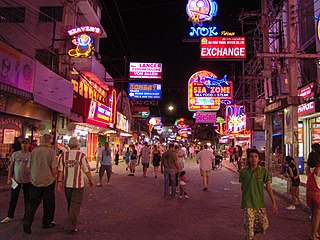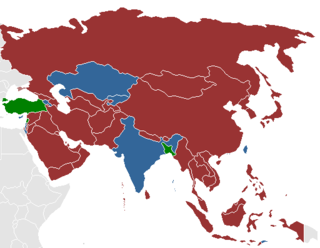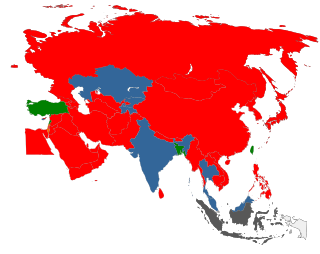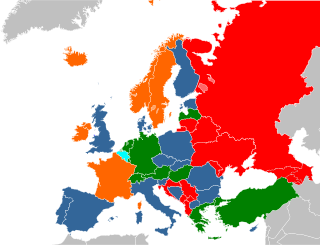Related Research Articles

Child prostitution is prostitution involving a child, and it is a form of commercial sexual exploitation of children. The term normally refers to prostitution of a minor, or person under the legal age of consent. In most jurisdictions, child prostitution is illegal as part of general prohibition on prostitution.

Prostitution in Thailand is not itself illegal, but public solicitation for prostitution is prohibited if it is carried out "openly and shamelessly" or "causes nuisance to the public". Due to police corruption and an economic reliance on prostitution dating back to the Vietnam War, it remains a significant presence in the country. It results from poverty, low levels of education and a lack of employment in rural areas. Prostitutes mostly come from the northeastern (Isan) region of Thailand, from ethnic minorities or from neighbouring countries, especially Cambodia, Myanmar, and Laos. In 2019, the Joint United Nations Programme on HIV/AIDS (UNAIDS) estimated the total population of sex workers in Thailand to be 43,000.
Prostitution is illegal in Russia. The punishment for engagement in prostitution is a fine from 1500 up to 2000 rubles. Moreover, organizing prostitution is punishable by a prison term. Prostitution remains a very serious social issue in Russia.

Prostitution is legal in India, but a number of related activities including soliciting, kerb crawling, owning or managing a brothel, prostitution in a hotel, child prostitution, pimping and pandering are illegal. There are, however, many brothels illegally operating in Indian cities including Mumbai, Delhi, Kolkata, Pune, and Nagpur, among others. UNAIDS estimate there were 657,829 prostitutes in the country as of 2016. Other unofficial estimates have calculated India has roughly 3 million prostitutes. India is widely regarded as having one of the world's largest commercial sex industry. It has emerged as a global hub of sex tourism, attracting sex tourists from wealthy countries. The sex industry in India is a multi-billion dollar one, and one of the fastest growing.
Forced prostitution, also known as involuntary prostitution or compulsory prostitution, is prostitution or sexual slavery that takes place as a result of coercion by a third party. The terms "forced prostitution" or "enforced prostitution" appear in international and humanitarian conventions, such as the Rome Statute of the International Criminal Court, but have been inconsistently applied. "Forced prostitution" refers to conditions of control over a person who is coerced by another to engage in sexual activity.

Procuring, pimping, or pandering is the facilitation or provision of a prostitute or other sex worker in the arrangement of a sex act with a customer. A procurer, colloquially called a pimp or a madam or a brothel keeper, is an agent for prostitutes who collects part of their earnings. The procurer may receive this money in return for advertising services, physical protection, or for providing and possibly monopolizing a location where the prostitute may solicit clients. Like prostitution, the legality of certain actions of a madam or a pimp vary from one region to the next.
Prostitution is illegal in Saudi Arabia, and is punishable by imprisonment and fines. Flogging was also a possible punishment until April 2020 when it was abolished by the order of the Saudi Supreme Court General Commission. Foreign nationals are also deported after punishment. If the parties are also charged with adultery, fornication and sodomy, which can apply to both the prostitute and the client since all sexual activity outside a lawful marriage is illegal, the punishment can be death.

Prostitution is a type of sex work that involves engaging in sexual activity in exchange for payment. The definition of "sexual activity" varies, and is often defined as an activity requiring physical contact with the customer. The requirement of physical contact also creates the risk of transferring infections. Prostitution is sometimes described as sexual services, commercial sex or, colloquially, hooking. It is sometimes referred to euphemistically as "the world's oldest profession" in the English-speaking world. A person who works in the field is usually called a prostitute or sex worker, but other words, such as hooker and whore, are sometimes used pejoratively to refer to those who work in prostitution. The majority of prostitutes are female and have male clients.

Prostitution in Pakistan is a taboo culture of sex-trade that exists as an open secret but illegal. Prostitution is largely based in organisational setups like brothels or furthered by individual call girls.
Prostitution in Luxembourg is in itself legal, and is common, but activities associated with organised prostitution, such as profiting from or aiding prostitution, are illegal. Human trafficking incurs severe penalties. There are estimated to be 300 prostitutes in Luxembourg, most of whom are immigrants.
Prostitution in Lebanon is nominally legal and regulated. However, no licences have been issued since 1975. In modern Lebanon, prostitution takes place semi-officially via 'super night clubs', and illegally on the streets, in bars, hotels and brothels. UNAIDS estimate there to be 4,220 prostitutes in the country.

The legality of prostitution in Europe varies by country.
Thailand is a centre for child sex tourism and child prostitution. Even though domestic and international authorities work to protect children from sexual abuse, the problem still persists in Thailand and many other Southeast Asian countries. Child prostitution, like other forms of child sexual abuse, not only causes death and high morbidity rates in millions of children but also violates their rights and dignity.

Prostitution laws varies widely from country to country, and between jurisdictions within a country. At one extreme, prostitution or sex work is legal in some places and regarded as a profession, while at the other extreme, it is considered a severe crime punishable by death in some other places. A variety of different legal models exist around the world, including total bans, bans that only target the customer, and laws permitting prostitution but prohibiting organized groups, an example being brothels.

Nefarious: Merchant of Souls is a 2011 American documentary film about modern human trafficking, specifically sexual slavery. Presented from a Christian worldview, Nefarious covers human trafficking in the United States, Western and Eastern Europe, and Southeast Asia, alternating interviews with re-enactments. Victims of trafficking talk about having been the objects of physical abuse and attempted murder. Several former prostitutes talk about their conversion to Christianity, escape from sexual oppression, and subsequent education or marriage. The film ends with the assertion that only Jesus can completely heal people from the horrors of sexual slavery.

Natasha Falle is a Canadian professor at Humber College in Toronto, Ontario, Canada, who was forcibly prostituted from the ages of 15 to 27 and now opposes prostitution in Canada. Falle grew up in a middle-class home and, when her parents divorced, her new single-parent home became unsafe, and Falle ran away from home. At the age of 15, Falle became involved in the sex industry in Calgary, Alberta.
Bridget Perrier is an activist and former trafficked prostitute who cofounded Sex Trade 101 with Natasha Falle. She became a child prostitute at the age of 12 while she was staying at a group home and an older girl there persuaded her to become a runaway in order to sell sex to a pedophile named Charlie. She had a son, Tanner, who developed cancer as an infant and died at the age of five with the dying wish that his mother get out of the sex industry. In 2000, she moved to Toronto from Thunder Bay, Ontario, Canada. She is the stepmother of Angel, whose biological mother was Brenda Wolfe, one of Robert Pickton's murder victims. In 2009, Perrier accompanied Angel at Toronto's Native Women's Resource Centre for the Sisters in Spirit vigil in remembrance of Wolfe and the other more than 500 Canadian Aboriginal women who have been murdered or gone missing over the past 30 years. In 2010, Perrier picketed a courthouse in downtown Toronto in recognition of International Day of No Prostitution. She was joined by Trisha Baptie, Natasha Falle, Katarina MacLeod, and Christine Barkhouse, all former human trafficking victims. In 2012, after being removed from a news conference relating to Bedford v. Canada, Perrier demonstrated a pimp stick to the media, saying that she had been battered with a pimp stick by her pimp every day that he prostituted her. Perrier opposed the legalization of brothels as proposed in Bedford v. Canada, saying, "Having a legal bawdy house is not going to make it any safer. You are still going to attract serial killers, rapists, perverts." Bridget shared her story in the ground breaking article by Dr. Vincent J. Felitti in Cancer InCytes magazine about how childhood trauma is associated with chronic diseases during adulthood and how child trafficking will eventually worsen the economic burden on civil governance.

Dreamcatcher is a 2015 British-American documentary film directed by Kim Longinotto focusing on Brenda Myers-Powell, a former professional who runs The Dreamcatcher Foundation, a charity which helps women in Chicago leave the sex industry. The film won the World Cinema Directing Award in the documentary category at the 2015 Sundance Film Festival. Showtime Networks acquired the rights to the film on 23 January 2015.

Human trafficking in Nevada is the illegal trade of human beings for the purposes of reproductive slavery, commercial sexual exploitation, and forced labor as it occurs in the state of Nevada, and it is widely recognized as a modern-day form of slavery. It includes "the recruitment, transportation, transfer, harboring or receipt of persons by means of threat or use of force or other forms of coercion, of abduction, of fraud, of deception, of the abuse of power, or of a position of vulnerability or of the giving or receiving of payments or benefits to achieve the consent of a person having control over another person, for the purpose of exploitation. Exploitation shall include, at a minimum, the exploitation of prostitution of others or other forms of sexual exploitation, forced labor services, slavery or practices similar to slavery, servitude or the removal of organs."
The Dreamcatcher Foundation is a Chicago-based non-profit organization that helps women who want to stop working in the sex industry, especially female prostitutes. They offer services to help the women reintegrate into society. The non-profit organization is working towards creating a facility of their own where the women will be able to stay while getting help. They have saved 87 women since their foundation.
References
- 1 2 3 "My 25 Years as a Prostitute". BBC News. 30 June 2015. Retrieved 18 May 2023.
- 1 2 3 4 5 "Brenda Myers-Powell: My 25 Years as a Prostitute". silkeendress.com. silkeendress. Archived from the original on 23 October 2019. Retrieved 23 October 2019.
- 1 2 3 4 "Brenda Myers Powell". worldwithoutexploitation.org. worldwithoutexploitation. Retrieved 23 October 2019.
- 1 2 "about us". thedreamcatcherfoundation.org. thedreamcatcherfoundation. Retrieved 23 October 2019.
- 1 2 3 "Brenda Myers Powell (United States of America)". wikipeacewomen.org. wikipeacewomen. Retrieved 23 October 2019.
- ↑ Lee, Benjamin (2015-03-05). "Dreamcatcher review – deeply moving prostitution documentary". The Guardian. ISSN 0261-3077 . Retrieved 2020-10-19.
- ↑ "Brenda Myers-Powell's Story Illustrates the Need for Legalization". International Policy Digest. 2015-07-09. Retrieved 2020-10-19.